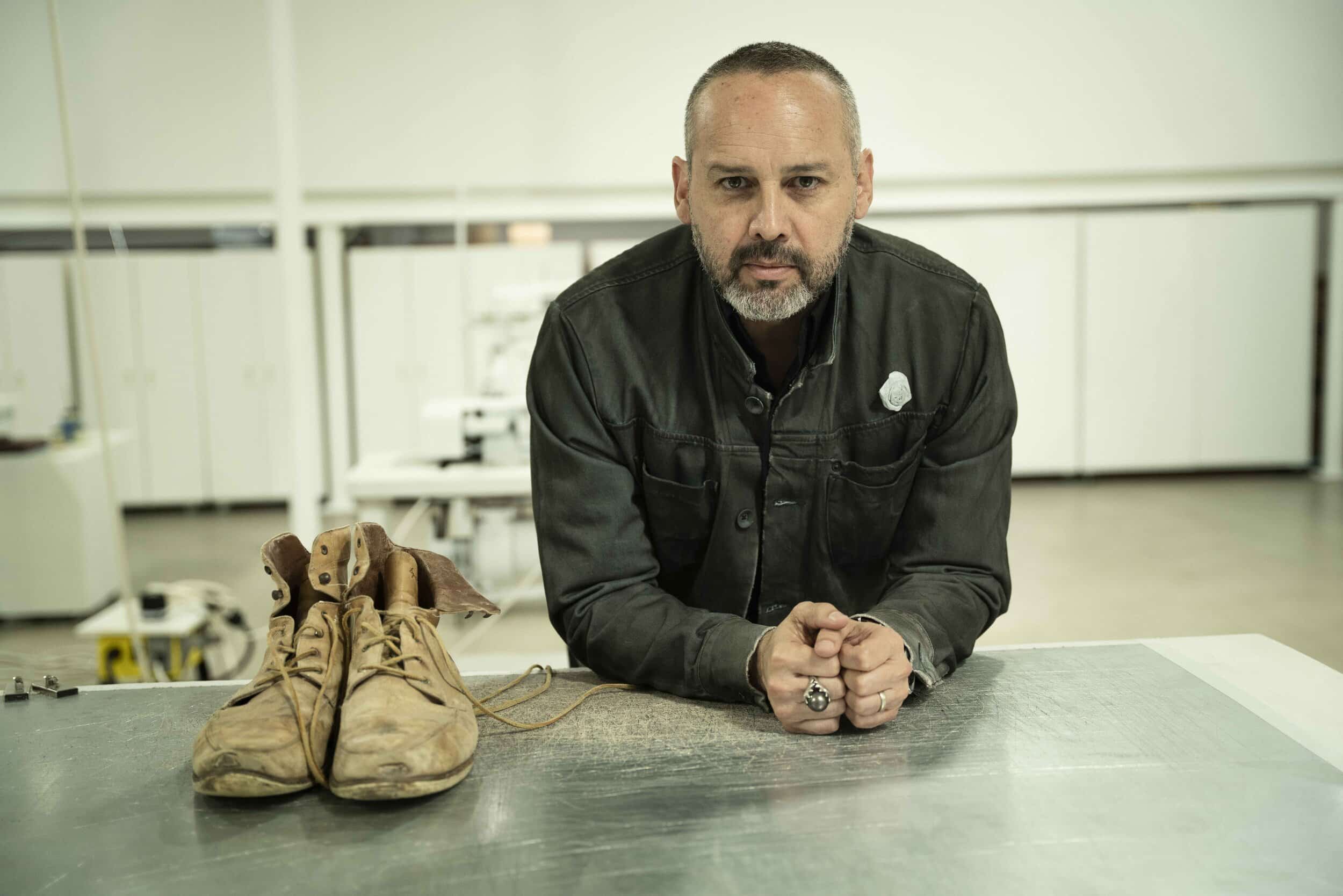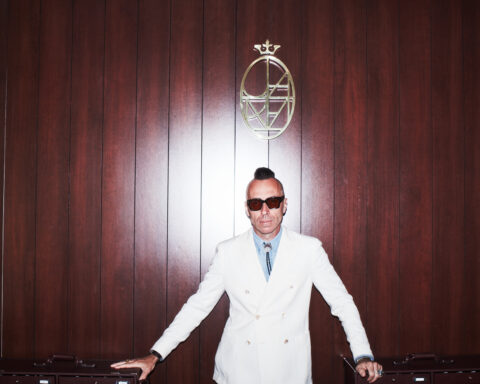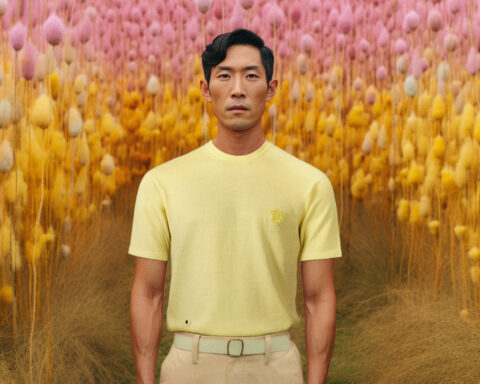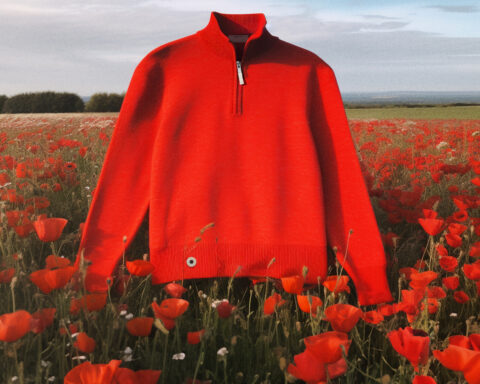George Esquivel’s story, from living in a motel room with his parents and four siblings to making shoes for Hollywood stars including Brad Pitt and Emma Stone, could be straight from a movie script.
The father-of-three has risen to the top of the fashion world from a tough childhood as the son of a drug dealer, using his own style of more honorable hustling to become one of the most sought-after shoe makers in the country.
Esquivel Shoes produce footwear from $300 sneakers to made to order boots costing thousands, mixing a casual Southern Californian feel with timeless sophistication and more than a splash of rock and roll.
And after 20 years working from Orange County, California, George moved onto his next act last month, opening an exciting new home for his brand in Downtown Los Angeles.
It’s a story of creativity, ingenuity and perseverance that has inspiration for us all – and the kind of Hollywood ending everyone enjoys.

George in Esquivel Shoes’ new DTLA home // 📸: Kurt Iswarienko
Tell me about your upbringing and how it inspired you on this path?
My father was a criminal, he was a drug dealer and a drug addict and a crazy individual. I went to 12 or 13 schools from kindergarten to high school. We would start the school year and then he would get thrown in jail. We wouldn’t be able to pay the rent and we would get evicted and move into a motel. It was chaotic, there were seven of us — my mom and dad and I was the oldest of five — living in a roach-infested motel room or a relative’s spare bedroom. We were even homeless at a time. When I was 14, he said. “OK, this is a $10 bag, this is a $20 bag.” And I used to collect the money for his drugs.
In fifth grade, the police came in and spoke to us about drugs, and that’s when I started being ashamed of my father and realizing that just because he could beat anybody up, that didn’t mean he was a good guy. But my father was also a very intelligent man. He spoke two languages, during the Vietnam War, he was stationed in Germany. He used to help me with my French homework in junior high. He knew about cars, he knew about everything.
We were living in a motel when I was in junior high, and how embarrassing is that? I’m 13 or 14 years old but can’t have a girlfriend because we live in a motel. Then at 19, I got in a big fight with him and kicked him out the house and I took on the role of the father figure.

Esquivel Shoes
My escape during this time, when I was 19 or 20 years old and trying to be a dad and dealing with my siblings’ homework, was music and going to concerts. I’d go to punk shows in the second wave of punk in Orange County. And in my senior year of high school, I started getting into vintage clothes and thrift stores and trying to figure out who I was. My girlfriend, who is now my wife, and I used to go to Baja, Mexico, for the weekend, and on one of those trips I walked into a boot maker and asked them to make a pair of shoes for me. I did a quick sketch and I must have called them every few days for four months. And when I picked them up I couldn’t believe they had made me something I designed.
At this time I was driving a truck for a chain of linen stores, and my route was San Diego to Bakersfield. And I would stop at every shoe repair store along my route and ask if they knew anyone who could make a pair of shoes. After several tries and arguing with people and saying, “These things are ugly, give me my money back,” I found a guy right outside of Los Angeles in the City of Commerce. And he started making me shoes. I sold them to my friends and wore them to concerts. And at the time, everybody was wearing Doc Martens or creepers and I was wearing these vintage-looking shoes that everyone wanted. And in the first two and a half years we sold 2,500 pairs of shoes.
And six months into it, my guy started showing me the ropes and the different processes of making shoes. And I fell in love with the process, it was like an addiction. I never knew growing up that you could actually get paid to be creative. And the crazy thing is, I used to pay to go see these musicians play and now they’re coming over to my apartment, inviting me to their house, I’m standing on stage with them. So I opened up my own shop in Orange County 20 years ago last month. And now we’ve just moved into our new home in Downtown Los Angeles.

George Esquivel // 📸: Kurt Iswarienko
You mentioned your dad being a very bright guy, despite all his issues. Do you think, via nature or nurture, you inherited some of these skills and talents from him even though your relationship was so difficult?
I’m sure. Up until a certain age, I thought he was the greatest person in the world – he was this guy who beat people up. And I got my sense of style from my dad. Even when we were homeless, he always looked really good. He would actually take us kids to a store, have us cause a diversion, and then he gets new clothes and walks out. And growing up I also loved tinkering with cars, working with wood, and I’d buy lawnmowers and fix them up and sell them. So I was hustling too, but in a non-illegal way.
You mention it was pretty embarrassing being 13 and living in a motel. And shoes are such a big deal at school, aren’t they? Whether or not you are wearing the new $150 Nikes. So now to be doing what you’re doing, how does that feel?
The lack of the shoes drove me to shoes. Because you can just wear a pair of black jeans and a black t-shirt, but everybody notices the shoes in high school. I used to have to wear the fake Reeboks and it was the most embarrassing thing in the world. I always say God has an interesting sense of humor. To be able to say, “You couldn’t afford that, but now you’re selling $2,000 and $3,000 shoes.”

Esquivel Shoes
Tell us about your new space in Downtown Los Angeles.
It’s appointment only because it’s a working shop, so we have to control the environment. We can’t have somebody walk in and grab a knife and cut themselves or something. And we want them to feel special when they come in to purchase shoes. I don’t want them to feel rushed or looking over their shoulder. It’s meant to be very controlled and inviting. We call it Esquivel House, you come here and hang out. We have clients here for three hours, and just enjoy the process of making shoes and have a glass of wine or champagne.
How has it been opening it during the pandemic?
Well, what else is there to do? You’ve got to keep moving. I guess my philosophy in life is, “If I’m going to go down, I’m gonna go down fighting.” I’m not going to wait for a miracle to happen. God blessed me with so much, and I’ve got to grind it out. If it doesn’t work, it doesn’t work. But I don’t want to say I didn’t give it my best. And right now, it’s working. Don’t get me wrong, it’s a struggle. But like everybody else, we’re surviving.

George Esquivel // 📸: Kurt Iswarienko
What mentors have you had in your career?
There have been so many great guys. In 2009 I was part of the Vogue Fashion Fund, so the CFDA (The Council of Fashion Designers of America) mentors you and guides you. So there has been Anna Wintour of Vogue, Tommy Hilfiger is a great guy, and Seth Allison who is an executive at Levi’s has been another mentor. Bob Hurley of the brand Hurley was one of my first, I used to make his shoes and go to his house and ask him advice. And Jim Moore from GQ is another. To be honest with you, everybody who has purchased a pair of shoes from me, to me is an investor. Those people allow me to do what I do. And I just feel so honored and blessed that we have so many people that appreciate what we do and support us.
You talked a bit about music, but tell us a bit more about your style and influences.
So rock and roll is at the heart of my influence. But it’s also very southern California. We’re a bit vagabond here in Southern California, anything goes. So our style of shoes is Southern California casual with a bit of sophistication. I’ve worked in Paris, I’ve worked in Milan, I’ve worked in Japan, and I think I’ve taken all those elements and molded them into also my Southern California aesthetic. And it’s this whole melting pot.

George Esquivel // 📸: Kurt Iswarienko
On this site we speak to a lot of people in the style industry, like yourself, but we’re interested in what’s inside too, how people maintain their inner style. How do you keep your balance and your health, happiness and clarity of mind as a busy, creative entrepreneur?
I think for me, a lot of it is just staying grounded, staying close to God and staying close to my family. I try to put God and my family first and everything else comes out of that. Because if I’m honoring God and honoring my family, then I’m doing the right thing. And we all fail, we all mess up and we’ve got to get back up. But that’s kind of the goal. I love what I do but my legacy is going to be my kids. If my kids are doing well in life, and they’re happy, I get so much more excitement from that then my business. I love my business, don’t get me wrong, this is like one of my kids. But I want my kids to be proud of me and I want my wife to be proud of what we do.
I also journal a lot, I try to mountain bike often. I try to stay healthy and I meditate every morning and get my thoughts straight before the craziness happens. And I have a pretty good drive into LA and back home, and those are my times to really reflect, prepare and meditate for the day. A lot of it is having the right attitude, showing grace and not getting upset with people.
Do you hope to be an inspiration to others coming from a similar background as you did?
My brother and I mentor kids and have spoken at the youth jails. There were families in my life that were beacons. My father-in-law was an amazing man. He was someone that just showed a lot of love. And my best friend in high schools dad, those two men were both a huge influence. And what I realized is, when you have a beacon in life, you kind of want to be like that. And it was never about the money, my father-in-law wasn’t a wealthy man. But he loved his family. And what my brother and I have always talked about is trying to be a beacon to other young men, saying, “Hey, you can have what I have and even more.” The cops aren’t gonna show up and take everything away from you all the time, if you work for it, if you study. Because when my dad was locked up for a year and a half, all that got us out of that was hard work.











